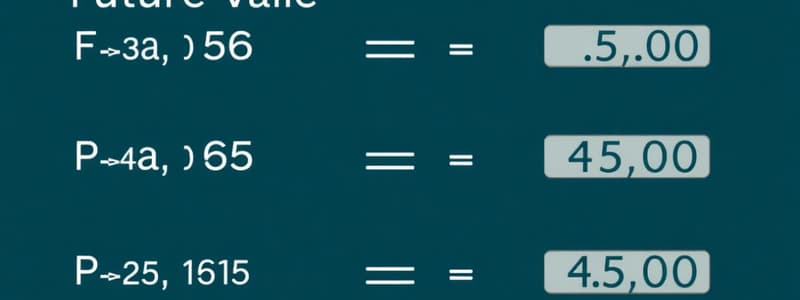Podcast
Questions and Answers
What does the symbol $\sigma_i$ represent in portfolio theory?
What does the symbol $\sigma_i$ represent in portfolio theory?
- The expected return of Asset $i$
- The weight of Asset $i$ in the portfolio
- The variance of return of Asset $i$
- The standard deviation of Asset $i$ (correct)
Which formula correctly represents the variance of a portfolio with two assets?
Which formula correctly represents the variance of a portfolio with two assets?
- Var[$R_p$] = $\sigma_A^2 + \sigma_B^2 + 2 \rho_{A,B}$
- Var[$R_p$] = $w_A^2 \sigma_A^2 + w_B^2 \sigma_B^2 + 2 w_A w_B \sigma_{A,B}$ (correct)
- Var[$R_p$] = $w_A^2 \sigma_A + w_B^2 \sigma_B + 2 w_A w_B \sigma_{A,B}$
- Var[$R_p$] = $w_A \sigma_A^2 + w_B \sigma_B^2 + w_A w_B \rho_{A,B}$
How is the expected return of a portfolio $E[R_p]$ calculated?
How is the expected return of a portfolio $E[R_p]$ calculated?
- By summing the variances of all assets
- By dividing total return by the number of assets
- By multiplying the weight of each asset with its expected return (correct)
- By averaging the expected returns of all assets equally
What does the term $\beta_p$ signify in portfolio management?
What does the term $\beta_p$ signify in portfolio management?
In the covariance formula $\text{Cov}{A,B} = (\rho{A,B})(\sigma_A)(\sigma_B)$, what does $\rho_{A,B}$ represent?
In the covariance formula $\text{Cov}{A,B} = (\rho{A,B})(\sigma_A)(\sigma_B)$, what does $\rho_{A,B}$ represent?
What does $PVIFA_{i,n}$ represent in the equation $PV = PMT imes (PVIFA_{i,n})$?
What does $PVIFA_{i,n}$ represent in the equation $PV = PMT imes (PVIFA_{i,n})$?
In the equation $PV = \frac{CF}{i}$, what does $CF$ stand for?
In the equation $PV = \frac{CF}{i}$, what does $CF$ stand for?
What is the significance of the variable $g$ in the equation $PV = \frac{CF_1}{(i - g)}$?
What is the significance of the variable $g$ in the equation $PV = \frac{CF_1}{(i - g)}$?
In the equation $P_0 = \sum_{t=1}^{m} \frac{D_t}{(1 + k)^t} + \frac{D_{m+1}}{(k - g)(1 + k)^m}$, what does $D_t$ represent?
In the equation $P_0 = \sum_{t=1}^{m} \frac{D_t}{(1 + k)^t} + \frac{D_{m+1}}{(k - g)(1 + k)^m}$, what does $D_t$ represent?
What variable is calculated using the equation $\sigma_A^2 = \sum_{i=1}^n (p_i)(R_i - E[R_A])^2$?
What variable is calculated using the equation $\sigma_A^2 = \sum_{i=1}^n (p_i)(R_i - E[R_A])^2$?
In the context of covariance, what does $\sigma_{A,B} = \sum_{i=1}^n (p_i)(R_{i,A} - E[R_A])(R_{i,B} - E[R_B])$ represent?
In the context of covariance, what does $\sigma_{A,B} = \sum_{i=1}^n (p_i)(R_{i,A} - E[R_A])(R_{i,B} - E[R_B])$ represent?
Which equation uses the compound interest formula to determine future value?
Which equation uses the compound interest formula to determine future value?
What does the variable $i$ typically represent in the provided equations?
What does the variable $i$ typically represent in the provided equations?
Flashcards are hidden until you start studying
Study Notes
Future Value and Present Value Formulas
- FV = PV[1 + (i)(n)] calculates the future value of an investment with simple interest. The formula determines the future value of an investment based on the present value, interest rate, and number of periods.
- FV = PV(1 + i)^n calculates the future value of an investment with compound interest. This formula considers the compounding impact of interest earned.
- PV = PMT ⋅ (PVIFAi,n) determines the present value of an annuity stream of payments. It represents the lump-sum amount you would need to invest today to receive a series of equal payments for a specified period.
- PV = PMT ⋅ (PVIFAi,n)(1 + i) calculates the present value of an annuity stream of payments with an immediate payment at the beginning of the period.
- PV = CF/i determines the present value of a perpetuity with constant cash flows. It represents the current value of an infinite series of equal payments.
- PV = CF₁/(i - g) calculates the present value of a growing perpetuity with constant cash flows compounded at a consistent growth rate.
Stock Valuation Models
- P₀ = Σt=1m Dt/(1 + k)t + Dm+1/(k - g)(1 + k)m is the discounted dividend model for valuing a stock with a finite dividend horizon. The formula determines the present value of the expected future dividends and the terminal value of the stock at the end of the horizon.
Risk and Return
- σA2 = Σi=1n (pi)(Ri - E[RA])2 represents the variance of asset A. It measures the dispersion of possible returns around the expected return.
- σA,B = Σi=1n (pi)(Ri,A - E[RA])(Ri,B - E[RB]) calculates the covariance between assets A and B. It measures the tendency for assets to move together.
- CovA,B = (ρA,B)(σA)(σB) describes the covariance between assets A and B. It relates the correlation, standard deviation of asset A, and asset B to determine the covariance between the two.
- E[Rp] = Σi=1n (wi)(Ri) calculates the expected return of a portfolio. It represents the weighted average of the expected returns of the assets in the portfolio.
- Var[Rp] = wA2σA2 + wB2σB2 + 2wAwBσA,B determines the variance of portfolio return. It represents the squared deviation of possible portfolio returns around the expected return.
- βp = Σi=1n (wi)(βi) calculates the beta of a portfolio. It represents the weighted average of the betas of the individual assets in the portfolio.
- σi = √Var(Ri) determines the standard deviation of asset i. It measures the riskiness of an asset by calculating the square root of its variance.
Studying That Suits You
Use AI to generate personalized quizzes and flashcards to suit your learning preferences.



